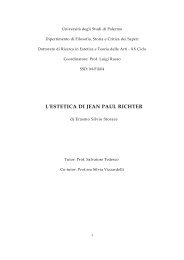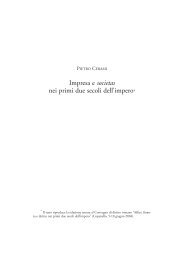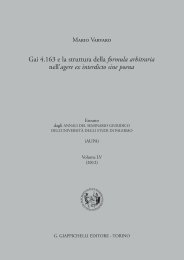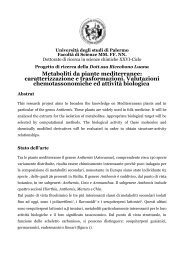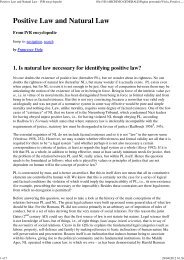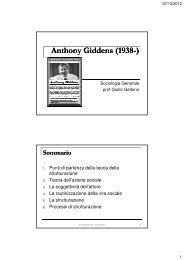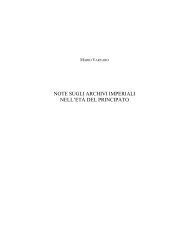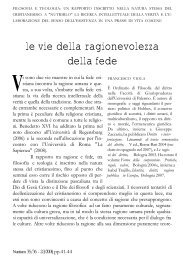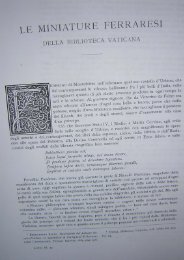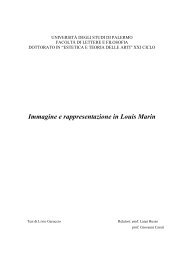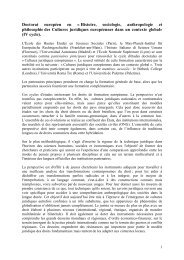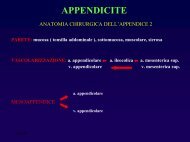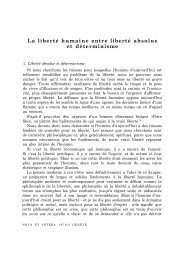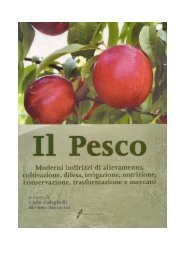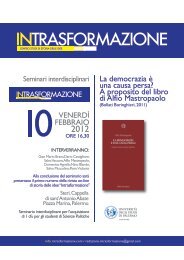F. TERRANOVA, Osservazioni su Gai 2.108 pp. 281 - Università di ...
F. TERRANOVA, Osservazioni su Gai 2.108 pp. 281 - Università di ...
F. TERRANOVA, Osservazioni su Gai 2.108 pp. 281 - Università di ...
Create successful ePaper yourself
Turn your PDF publications into a flip-book with our unique Google optimized e-Paper software.
Per quanto riguarda i sottoposti (is... qui in potestate est aut familiae<br />
emptoris aut ipsius testatoris), è evidente che tale impossibilità si ricollega<br />
alla loro posizione all’interno della familia del testatore o del familiae<br />
emptor, incompatibile con la ‘terzietà’ che il testis deve necessariamente<br />
rivestire all’interno dell’atto. 27 Da quest’ultimo, infatti, deri-<br />
27 La maggior parte degli stu<strong>di</strong>osi ritiene, infatti, che testis abbia la stessa ra<strong>di</strong>ce <strong>di</strong> tres<br />
(da cui, poi, tertius). Il termine osco dal quale sarebbe derivato quello latino, attraverso il<br />
passaggio per una forma interme<strong>di</strong>a *terstis, sarebbe verosimilmente *tristis. Così R. VON<br />
PLANTA, Grammatik der oskisch-umbrischen Dialekte, II. Formenlehre, Syntax, Sammlung der<br />
Inschriften und Glossen, Anhang, Glossar, Strassburg 1897 (ristampa Berlin - New Jork<br />
1973), 621 nt. 1; K. BRUGMANN, Kurze vergleichende Grammatik der indogermanischen<br />
Sprachen, Strassburg 1904, 120 (§ 180, 1), 370 (§ 447, 3); F. SKUTSCH, Zur lateinische<br />
Grammatik, 4. Testis ‘Zeuge’, in Kleine Schriften, a cura <strong>di</strong> W. KROLL, Leipzig-Berlin 1914,<br />
84 ss.; F. STOLZ - J.H. SCHMALZ, Lateinische Grammatik, Laut- und Formenlehre Syntax und<br />
Stilistik 5 , München 1928, 119 (§ 102, a), 163 (§ 145, d); G. DEVOTO, L’etrusco come interme<strong>di</strong>ario<br />
<strong>di</strong> parole greche, in Scritti minori, II, Firenze 1967, 121; R. COLEMAN, Italic, in<br />
AA. Vv., Indo-European Numerals, a cura <strong>di</strong> J. GVOZDANOVIĆ, Berlin-New York 1992, 424.<br />
Il significato della parola, secondo molti, sarebbe quin<strong>di</strong> ‘colui che è terzo’. Così H.<br />
LÉVY-BRUHL, Le témoignage instrumentaire, cit., 6, con bibliografia (cfr. nt. 2); F. SKUT-<br />
SCH, Zur lateinische Grammatik, 4. Testis ‘Zeuge’, cit., spec. 87 s., con altre fonti; M. KA-<br />
SER, s.v. Testimonium, cit., 1021; U. COLI, Il testamento nella Legge delle XII Tavole, cit., 44<br />
nt. 72; A. ERNOUT - A. MEILLET, Dictionnaire étymologique de la Langue latine. Histoire<br />
des mots 4 , Paris 1959, 689, s.v. testis; G. BROGGINI, La prova nel processo romano arcaico, in<br />
Jus 11 (1960), 376; A. WALDE - J.B. HOFMANN, Lateinisches Etymologisches Wörterbuch 4 ,<br />
II, Heidelberg 1965, 676 s., s.v. testis; A. BISCARDI, Lezioni <strong>su</strong>l processo romano antico e classico,<br />
Torino 1968, 104; É. BENVENISTE, Le vocabulaire des institutions indo-européennes, 2.<br />
pouvoir, droit, religion, Paris 1969, 277; B. ALBANESE, Il processo privato romano delle legis<br />
actiones, Palermo 1987, 135 nt. 468; C. MASI DORIA, Aurem vellere, in Iuris Vincula. Stu<strong>di</strong><br />
in onore <strong>di</strong> Mario Talamanca, V, Napoli 2001, 327 nt. 40; L. LOSCHIAVO, Figure <strong>di</strong> testimoni<br />
e modelli proces<strong>su</strong>ali tra antichità e primo me<strong>di</strong>oevo, Milano 2004, 11. A sostegno<br />
della vicinanza etimologica <strong>di</strong> testis con tertius cfr. Pompon., Atell., 143 [Scaen. rom. poesis<br />
fragm. 3 , II, ed. O. RIBBECK, Leipzig 1873 (rist. Hildesheim 1962), 246]: ...ne quis ésset<br />
testis tértius rell. Contra G. REDARD, Latin testis «témoin = troisième»?, in Recerches de Linguistique.<br />
Hommages à Maurice Leroy, Bruxelles 1980, 163-171 (con ampia letteratura ivi,<br />
e nelle note e nel testo, citata) che dubita della parentela etimologica <strong>di</strong> testis con tertius e<br />
ritiene che il termine significhi semplicemente «assistant», «by-stander», «qui assiste à<br />
quelque chose», «qui assiste quelqu’un» (op. cit., 170-171). Dello stesso avviso è J.T. KATZ,<br />
Testimonia Ritus italici: male Genitalia, solemn Declarations, and a new Latin sound Law,<br />
in Harvard Stu<strong>di</strong>es in Classical Philology 98 (1998), 184 ss. V., però, <strong>su</strong>l punto quanto rilevato<br />
da É. BENVENISTE, Le vocabulaire des institutions indo-européennes, II, cit., 276 s.<br />
<strong>su</strong>lla <strong>di</strong>fferenza <strong>di</strong> significato fra <strong>su</strong>perstes e testis. Superstes significa «qui se tient (stat) <strong>su</strong>r<br />
(<strong>su</strong>per) la chose même, qui y assiste; qui est présent» (op. cit., 276). Testis «est celui qui assiste<br />
en “tiers”... à une affaire où deux personnages sont intéressés» (op. cit., 277).<br />
In letteratura sono state ipotizzate anche altre possibili origini del termine testis. Ad<br />
esempio da stare (te-steti) e datékein(produrre) [cfr., per tutti, C.G. BRUNS, Die sieben<br />
293



